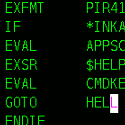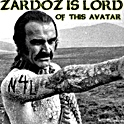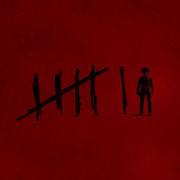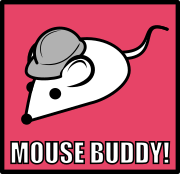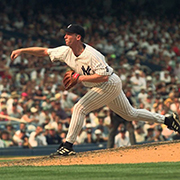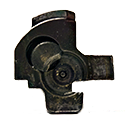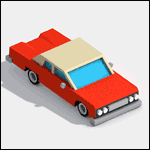|
I am certain i hosed up a bunch of stuff on the test that didn't get counted by the instructors
|
|
|
|

|
| # ? May 29, 2024 07:19 |
|
Slavvy posted:The throttle has settings other than 100% fyi Yeah, 0%.
|
|
|
|
Slavvy posted:Holy gently caress there's some bad instructors out there, jesus! You should be covering the brake 100% of the time that you aren't on the throttle, and even when you are on the throttle and near potential danger. The time it takes to reach the lever and sort out what you're doing translates into distance on the road that is literally the difference between life and death. But I think you could make a good argument that those slow speed cone maneuvers are not really helpful to learn actual riding. I've been riding 16 years now on street and track and I still haven't had to do a u-turn within two parking spaces without putting a foot down in order to save my own life.
|
|
|
|
Parking lot stuff is more about exhibiting control over the bike than being Actually Useful. I occasionally practice low-speed technical maneuvers, but yeah, "in the real world" that stuff basically never matters. Being able to slow down at any speed any lean is far, far more important, which is something they don't teach at all. The very first time I rode my bike (besides the 1 mile wobble home from the dealer), I came into this corner, someone was in the crosswalk, and I was completely unprepared to deal with it.
|
|
|
|
Toe Rag posted:Parking lot stuff is more about exhibiting control over the bike than being Actually Useful. This is my take as well. If you can do super tight figure 8s, u-turn in the box, weave very slowly in and out of cones, etc., you can do a lot of getting around a city and dealing with traffic with a better sense of confidence and stability. I still try to do u-turns without putting my foot down just for the exercise of it, but that in itself has no real practical purpose to me. All that poo poo added together gets me across town through a bunch of surface streets during heavy traffic and in and out of three crowded parking lots with ease though. Adding a class that focuses on harder braking and swerving makes it even easier and maybe even moderately enjoyable.
|
|
|
|
I have yet to hear an argument for not covering the brake that doesn't involve the newbie grabbing a handful of brakes, but we're talking about a class whose job is to teach you to brake progressively, in a safe lot, on bikes that are there to be dropped. Not teaching coverage and restraint seems weird to me, but then I don't really remember my BRC getting into specifics either way.
|
|
|
|
Literally replaced a clutch on a riding instructor's Scorpio three days ago, in the car park before classes started. We talked about this and he remarked that he isn't satisfied until they can deliberately lock the front wheel briefly, and also do a stoppie. This is for people wanting to learn from nothing in order to be able to sit the basic handling test, which is cone stuff.
|
|
|
|
|
Sometimes I wonder what getting a general driver's license, much less a motorcycle endorsement, is like in countries that take personal responsibility seriously. I mean, I've taken the BRC twice now 15 years apart, and both times I distinctly remember thinking, God almighty, how can they pass me, I've bumped at least one cone in the low speed slalom. Yet, both times I came back the next day wobbled through low speed maneuvers and got my endorsement alongside people who almost ran over instructors because they just couldn't conceptualize leaning the motorcycle to turn, so they grabbed the throttle and the brakes all at once...Now I'm hanging out in abandoned parking lots trying to determine how quickly I can go from one lean angle to another while they cruise bars. And neither of us actually got taught much beyond starting the bike and a warning that countersteer exists but you won't go fast enough to experience it here. While I almost certainly couldn't afford it, I would love to get an honest, well trained tutor with a synced intercom to observe me riding. Sometimes I even marvel that it's not a requirement now
|
|
|
|
If you're ever in western europe, you can just call a bike riding school and ask for a lesson. You can use their bike (yay) and their gear (ew). It's worth it if you've never ridden with a professional instructor before. Just make sure to get into a group with the right skill level and explain what you want exactly. One instructor usually takes 2 or 3 students with them, selected on their skill and progress. You could also book a trial exam, in which your usual instructor is instructing and scoring you as if you were doing the real exam (scored by an independent examiner) The bikes for full power students are usually SV650s and Kawa ER6s. Mine was a CB500f, but those have been retired by now afaik. The lessons in my country are around 60 euro per hour. Because quite often people select their school based on the exam pass percentage, the school will avoid getting you an exam appointment (there are only a limited number of those available per school) until the instructor is really sure that you're gonna pass. The whole process is expensive and nerve racking, because with each week that passes, you know the bill is increasing. You're also sent onto the highway right after your first introductory lesson and that's scary as gently caress because you're totally not used to riding a bike, let alone the hurricane force winds rushing past your body. One definite downside over here, is that in large parts of my country there are no twisties to speak of. So there's barely any road speed cornering training, only the slow speed stuff on the training parcours. It took me a long time before i got the hang of cornering at least semi properly, but i'm still completely certain that i'd be passed left and right if i were to go to the hills of Belgium/France/Germany. You are allowed to make several mistakes. One thing that my independant examiner noted, but didn't count as a bad mistake, is when i sped away on a highway onramp, leaving the examiner too far back in their car. They could just barely see me slide into a slightly too small space between a car and a van, but couldn't see everything properly. They said to me 'If i'd have seen the van's brake lights light up, i would've assumed you merged in front of the van too closely and failed you'. Aside from that, during normal lessons you're encouraged to keep up a good pace, not a single word was spoken about 'conserve fuel by shifting early and accelerating gently'. That was a thing during my car lessons, but never during bike lessons. EDIT: Found a british instructor ride: https://www.youtube.com/watch?v=fs1gIUrYaf4 Idk how good this one is, the dutch ones are pretty good but i'm gonna assume that you don't speak dutch. LimaBiker fucked around with this message at 08:47 on Jul 1, 2022 |
|
|
|
I would argue that what I went through to get my moto license was a serious attempt at rider education. I don't think it would be slavvy approved as learning to ride "properly" though, it seemed very much geared towards making us safe riders when going at the speed limit rather than being good riders. I think that would simply take too much time and be too expensive. I probably spend 50 hours or so on a bike before I was good enough to pass, almost half of that with a pro instructor. All pro instructor street riding was with intercom which was indeed very useful. Most of that riding was very much focused on passing the test, but a few times my instructor took pity on me and showed me some things that went beyond. One time he rode ahead of me and asked me to follow him way above the speed limit on a twisty road. All of a sudden the theoretical stuff about good corner lines that I was struggling with made sense which was great, but we had to break the law for me to understand this. He also insisted I should be able to ride fast on gravel, claiming it sometimes came up on the exam. Not sure if he lied but I'm grateful for that lesson anyways. I think I was a slightly faster learner than the average student because of previous experience. I think I spent a similar amount of time learning the theory, again material very much geared towards rider safety. A couple of questions about chassis and tire dynamics actually came up on my written exam so that's something at least. Covering the brakes in certain situations was a requirement to pass the exam ride - at least with your foot since thats all the man from the DMV could see from his bike.
|
|
|
|
I had a great instructor and we used Senas during lessons. Wasn't cheap though, about £45 per hour.
|
|
|
|
For just about any activity, training pays off infinitely better than equipment upgrades.
|
|
|
|
I had a fantastic two hour Sunday ride yesterday. Weather was perfect, cars were few and trucks nowhere to be seen. I went on a short ferry hop for the fine twisties on either end and shipped over next to a few other middle age men on way larger motorcycles than mine. There was a Hayabusa, a 1290 super duke and an MT09. I thought for sure I would see them all disappear in the distance once we got going on the other side but it turned out that KTM guy and I were in agreement on what was reasonable pace while the other two didn't feel like keeping up. Way to go corner speedy learner bike! I'm pretty sure KTM guy was never at WOT though, while I was flogging my little honda where appropriate like I always do whenever possible   I really should remove that tank warning sticker.
|
|
|
|
i have a question about engine braking. how can you tell if you are over-revving the engine? my bike doesn't have a tach. i know that engine braking isn't bad for the bike, but it sounds and feels awkward. when approaching a red light or a stop sign i'm having a hard time fighting the urge to just pull in the clutch and hit the brakes instead of shifting down through the gears incrementally. it's easy to tell when to shift up, but it's more difficult to know when to shift down.
|
|
|
|
MSPain posted:i have a question about engine braking. how can you tell if you are over-revving the engine? my bike doesn't have a tach. i know that engine braking isn't bad for the bike, but it sounds and feels awkward. when approaching a red light or a stop sign i'm having a hard time fighting the urge to just pull in the clutch and hit the brakes instead of shifting down through the gears incrementally. it's easy to tell when to shift up, but it's more difficult to know when to shift down. Have you ever hit the revlimiter (while accelerating)?
|
|
|
|
i have not. are you saying it's all good as long as you aren't hitting the limiter?
|
|
|
|
E: ^^^^ anything inside the rev limiter is fair game, that's the point of the rev limiter. Fwiw with your bike there's no point in pulling right to the limiter cause it stops making meaningful power a lot earlier than that so you actually go faster by upshifting at the point it starts to wheeze and drop off Are you matching revs as you go down? If you just drag the clutch with a shut throttle like you would on a car, it sucks a lot. How can you tell if you're over revving? The valves usually touch the piston and the bike stops. If that hasn't happened you're fine. There is no 'right' amount of engine braking, because engine braking isn't a thing. There are only three things you can do on an upright bike: speed up, slow down, move at a steady speed. Engine braking is a component of slowing down, using the brakes is a component of slowing down. What's the 'right' amount of front brake pressure? You can see how stupid that sounds; the right amount of front brake pressure is the amount that gets you the desired amount of slowing down. If I'm in a hurry to slow down I brake heavily with both brakes and I downshift early to get lots of engine braking, which brings with it extra stability and less work for the rear brake. If I'm gradually coasting to a stop I'll downshift fairly late, keeping things smooth and relaxed so the engine is barely spinning and I'm just lightly dragging the rear brake. If I'm riding like a dong the aim is to shift early enough while braking, that I'm in the right part of the engine's range when it's time to get back on the throttle, so I can accelerate properly ie it's not bogging down or running out of revs before I can exit the corner.
|
|
|
|
|
Slavvy posted:... in the right part of the engine's range when it's time to get back on the throttle... I think this is the crux of what i'm looking for. I'm not sure how to know if i'm using the right gear for the speed/rpm of a given situation. maybe this just comes with practice?
|
|
|
MSPain posted:I think this is the crux of what i'm looking for. I'm not sure how to know if i'm using the right gear for the speed/rpm of a given situation. maybe this just comes with practice? Kinda yeah. There is no 'right' gear. You start with what you're trying to do and work backwards from there. This ties back into my idea that rider training is fundamentally hosed because it's all back to front. I'm trying to tool along the motorway at steady speed? I'm in the highest gear the engine can sustain without bogging or grumbling. The actual number of the gear or the actual engine rpm are completely irrelevant. Your engine is very easy to understand because it's a single cylinder with a very ordinary torque curve. If you fully open the throttle in, say, third gear, at just above idle, you'll experience the following: bike bucks and grunts and chugs to start with, getting smoother and smoother, then starts to accelerate ever-faster as the engine hits it's sweet spot, then acceleration tapers off as you push past the efficient part of the range and get into the wheezy, strained sounding zone near the top, touching the limiter after considerable delay. This isn't a theoretical exercise, go out and actually do this, you won't hurt anything. The aim is to try to be in the smooth, meaty part of the torque curve throughout the corner. If you're having to upshift while you're still leaned over because it's screaming and wheezing, you're in too low a gear for that corner. If you're trying you accelerate out of the corner and it's bogged down and going nowhere, you're in too high a gear for that corner. Slavvy fucked around with this message at 23:29 on Jul 5, 2022 |
|
|
|
|
Slavvy posted:Your engine is very easy to understand because it's a single cylinder with a very ordinary torque curve. If you fully open the throttle in, say, third gear, at just above idle, you'll experience the following: bike bucks and grunts and chugs to start with, getting smoother and smoother, then starts to accelerate ever-faster as the engine hits it's sweet spot, then acceleration tapers off as you push past the efficient part of the range and get into the wheezy, strained sounding zone near the top, touching the limiter after considerable delay. This isn't a theoretical exercise, go out and actually do this, you won't hurt anything. This is really helpful and what I'm looking for, thanks. I wish they taught this stuff in the MSF course. I'm a bit mechanically minded so it's helpful to think about it from that perspective. Speaking of, I had just as much fun doing my first round of maintenance as I did riding this past weekend. Wrenching makes me feel in touch with the old ways.
|
|
|
|
This exact reason is why bikes with a broad, useable spread of power are almost always faster than bikes that only make big power at a billion rpm, despite having a smaller number. If the useable range is so narrow that you're always either bogging down and waiting for it to wake up, or running out of revs before the exit, or having to run super restricted lines to keep the engine on the boil, it literally makes no difference how big the number is because you're riding slow and horsepower can't change that. This is (one reason) why v-twins are more fun than fours, why four stroke gp bikes were always going to dominate the smokers, why a lazy 750 is better than a screaming 600 and so on. Take this newfound knowledge, apply it to the Harley Davidson conversation we had a little while ago, expand your miiiiind.... But this is also why small bikes are better for learning - big broad power is a crutch that absolves you of thinking about things like gears and rpm and the 'right' way of doing things, so in that sense, as amateur as you might feel right now, you're already at massive advantage compared to someone starting on a Harley or 650 twin.
|
|
|
|
|
did my first highway trip the other day, it was only for a few km's to get where i needed to go but figured no better time than now instead of taking just the city streets of course as I come up the on-ramp a huge truck decides to speed up and clearly not let me in, so i just accelerated forward past him. it was a bit nerve wracking at first, especially since as I hit high-speed from the ramp my visor slammed down due to the wind... doh but i took the exit ramp which wraps all the way around from west bound to south bound in a cloverleaf , didn't have any problem keeping it in the lane, felt good overall and then almost stalled it pulling off from a stop lol OH and i saw another bike in the lane beside me and gave him a wave, now i feel like the real deal
|
|
|
|
Slavvy posted:Literally replaced a clutch on a riding instructor's Scorpio three days ago, in the car park before classes started. We talked about this and he remarked that he isn't satisfied until they can deliberately lock the front wheel briefly, and also do a stoppie. This is for people wanting to learn from nothing in order to be able to sit the basic handling test, which is cone stuff. I've had my Class 6 license for - this'll be 18 years now, gently caress. When I've done braking practice at the start of the season, it's been finding a dead stretch of highway and doing as many stops as I can. And I thought I was good with that! Today I found an empty parking lot (where I've seen a motorcycle school operating before) and just did loops around it, running straight braking drills. Up to 60km in 1st, back to zero. Turns out the repeatability of braking at the same point over and over again is real fuckin important, because after I locked the front once, I tried applying pressure a hair more progressively, and avoided the zebra crossing paint, and I did my first stoppies. Ever. gently caress. Do your practice in a parking lot if at all possible, repeatability matters.
|
|
|
|
Yeah! Great job getting out and practicing!
|
|
|
Phy posted:I've had my Class 6 license for - this'll be 18 years now, gently caress. When I've done braking practice at the start of the season, it's been finding a dead stretch of highway and doing as many stops as I can. And I thought I was good with that! Hell yeah do stoppies erryday
|
|
|
|
|
Phy posted:I've had my Class 6 license for - this'll be 18 years now, gently caress. When I've done braking practice at the start of the season, it's been finding a dead stretch of highway and doing as many stops as I can. And I thought I was good with that! I like the feeling of getting heavier when you do a hard brake correctly. Its all nice and smooth and there's a point where you go "oof ok thats enough" but the bike handles it no problem. And the next time when the available grip isn't there you'll feel yourself 'slipping forward' because you're not getting heavier. That's a good signal to look ahead because i need more room to stop. This is an especially useful exercise when the weather isn't ideal; braking heavy on a damp surface really drives home how much weather impacts your safety margins.
|
|
|
|
Slavvy posted:This exact reason is why bikes with a broad, useable spread of power are almost always faster than bikes that only make big power at a billion rpm, despite having a smaller number. If the useable range is so narrow that you're always either bogging down and waiting for it to wake up, or running out of revs before the exit, or having to run super restricted lines to keep the engine on the boil, it literally makes no difference how big the number is because you're riding slow and horsepower can't change that. This is (one reason) why v-twins are more fun than fours, why four stroke gp bikes were always going to dominate the smokers, why a lazy 750 is better than a screaming 600 and so on. Take this newfound knowledge, apply it to the Harley Davidson conversation we had a little while ago, expand your miiiiind.... I love the "2-stroke GP bikes too difficult"---------> ??? ---------> "Harley good actually" progression.
|
|
|
|
I am very much enjoying being mainly in 2nd or 3rd on Fat Bob in the twisty roads around mine.
|
|
|
knox_harrington posted:I love the "2-stroke GP bikes too difficult"---------> ??? ---------> "Harley good actually" progression. If that's what you got out of that then idk what to say.
|
|
|
|
|
Slavvy posted:If that's what you got out of that then idk what to say. I thought it was an elaborate dunk on Honda's latest GP bike.
|
|
|
|
Slavvy posted:If that's what you got out of that then idk what to say. lighten up, dude.
|
|
|
Russian Bear posted:I thought it was an elaborate dunk on Honda's latest GP bike. Sadly the power delivery is the one thing they appear to have gotten right ImplicitAssembler posted:lighten up, dude. No Seriously though I genuinely can't tell who's being serious and who isn't anymore because ignorance and sarcasm now look basically identical
|
|
|
|
|
ImplicitAssembler posted:lighten up, dude.
|
|
|
|
ImplicitAssembler posted:lighten up, dude. he’s mad 
|
|
|
|
We're all mad
|
|
|
right arm posted:he’s mad Make some posts that aren't worthless maybe Jim Silly-Balls posted:We're all mad
|
|
|
|
|

|
|
|
|
I fitted some nice aftermarket levers this evening. Ever so slightly shorter brake and clutch with a nice bit of adjustment on reach. In black to replace the shiny silver blades it had. Dead easy, I love jobs like that.
|
|
|
|
Slavvy posted:why four stroke gp bikes were always going to dominate the smokers,
|
|
|
|

|
| # ? May 29, 2024 07:19 |
Rev. Dr. Moses P. Lester posted:In what sense do you mean that? Given that the eras in which 4t dominated 2t were only in the era before engineers figured out how to build a proper 2t and the modern era when 2t was either banned or restricted to half the displacement of 4t. Also that it's entirely possible, and has been done, to build a 2t with a relatively wide controllable powerband, and also to build a 4t with a narrow and difficult powerband. I'm referring to the modern era. The 500 2t's and modern 4t's had very similar specific output when you factor in the rpm difference. The idea was that the much lighter weight and lack of engine braking would make the 2t's competitive vs the 4t's much broader power band. In reality it was rarely even close, because slipper clutches and rider moxy reduced the 4t's disadvantages, but there was no way for a 2t rider to get more drive out of the corner There was no regulatory effort to throttle or restrict the 500's in any way, the fours were just better. You can absolutely build a 2t with a wide controllable power band, you just end up with no power, which is why none of the 500's were built that way except for maybe the Honda twins. The more power you want, the more peaky the engine gets, but for a given specific output a 4t will always have a broader spread than a 2t, doesn't really matter how you do it. You could see this play out when they went to 800's - the power spread became very narrow, but it was still more flexible than the old 500's. I would be interested to see what a modern DI 2t could do against a modern 4t GP bike. But even then it's not even stevens because modern MotoGP is heavily restricted technologically and is pretty far from what's 'possible' in a purely engineering sense. Slavvy fucked around with this message at 03:02 on Jul 7, 2022 |
|
|
|



